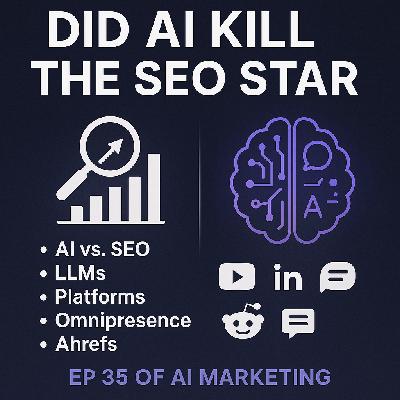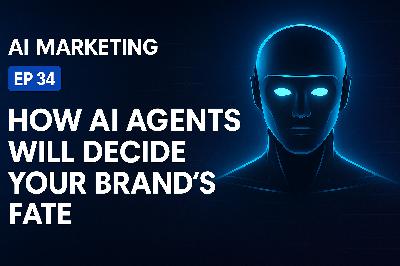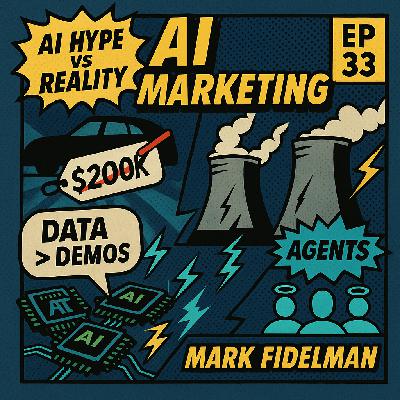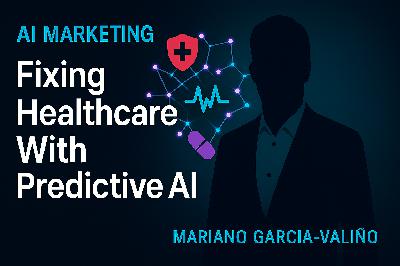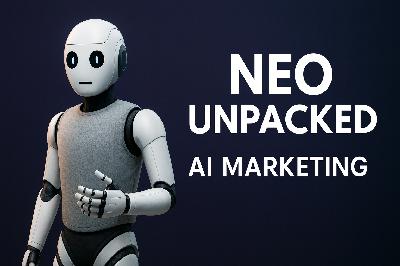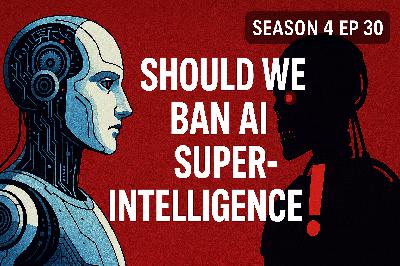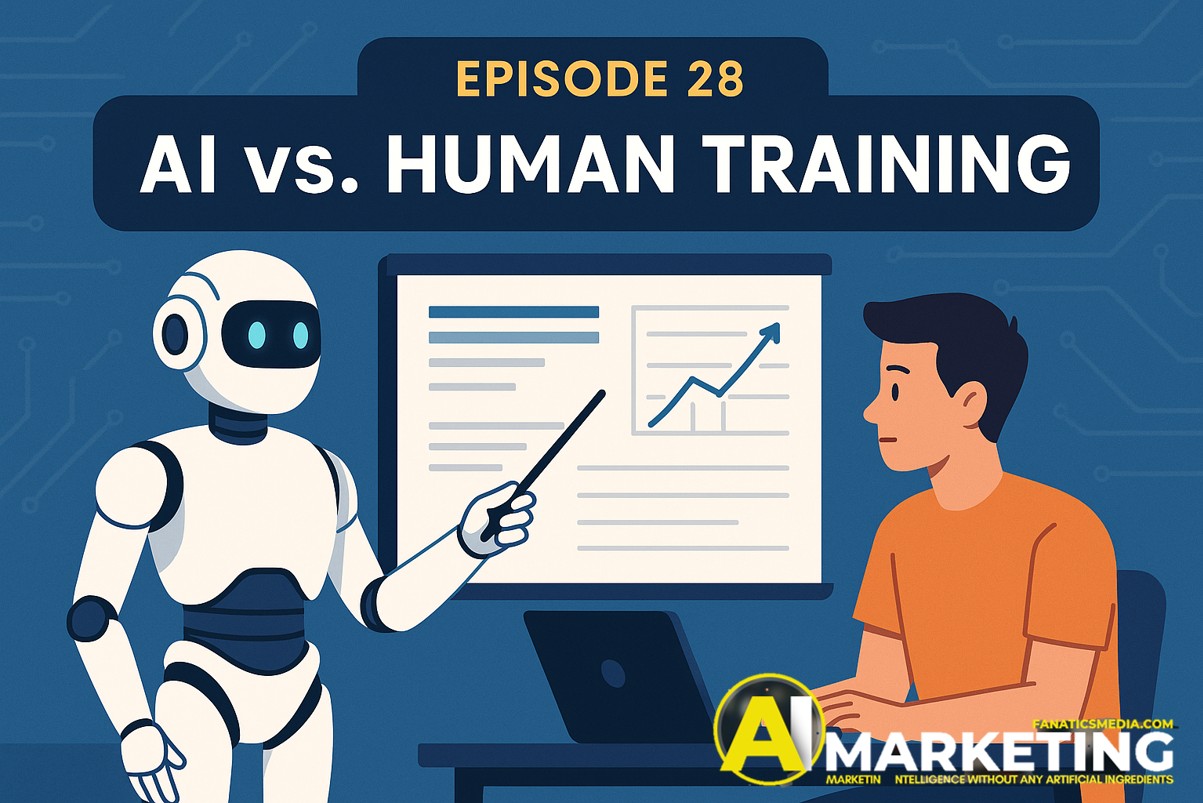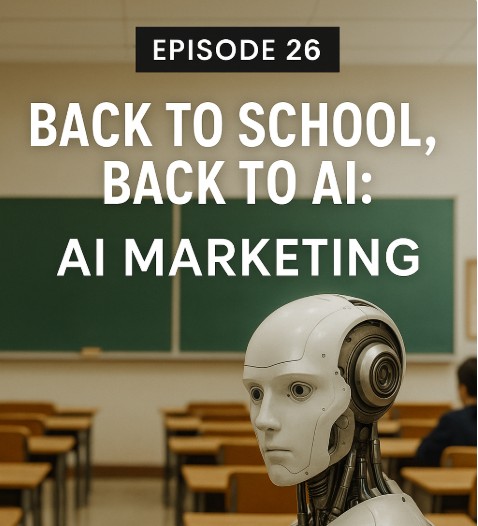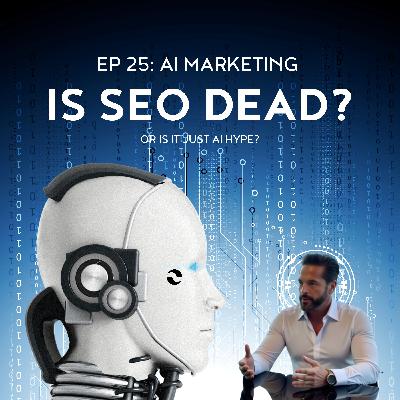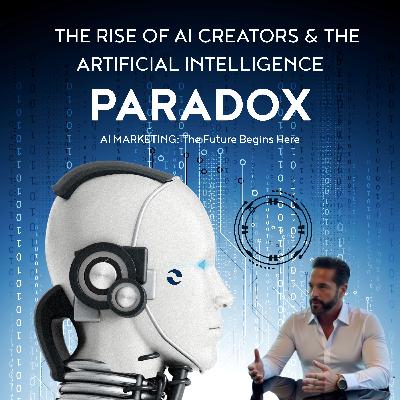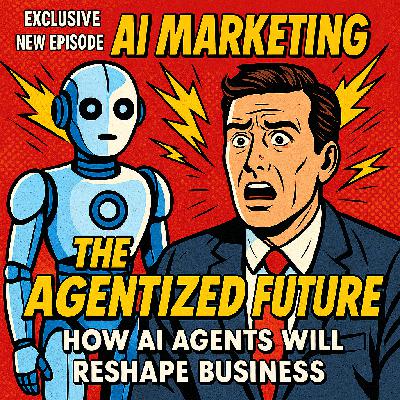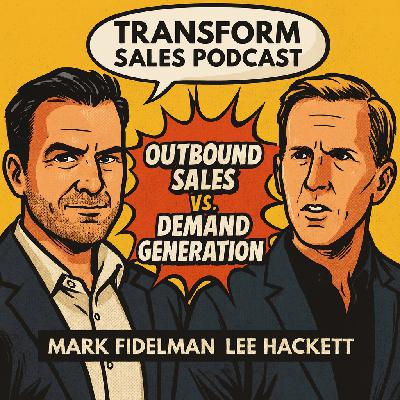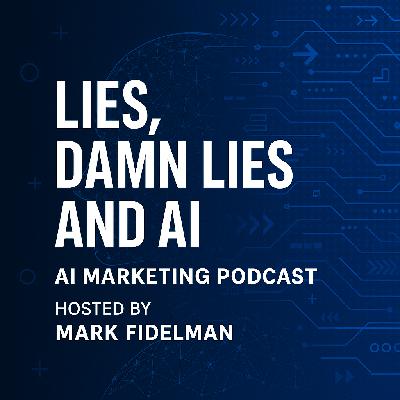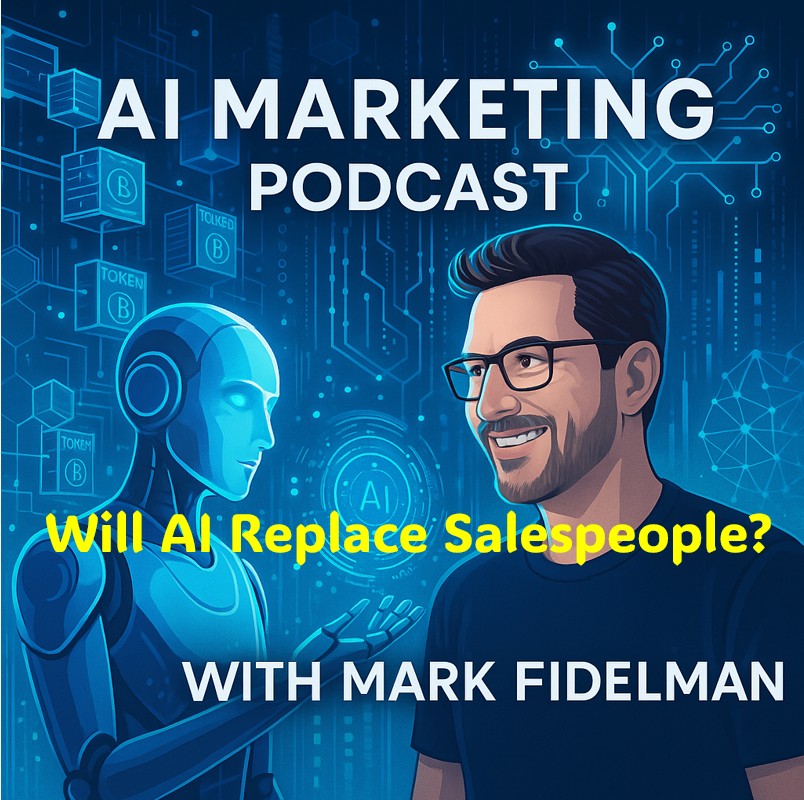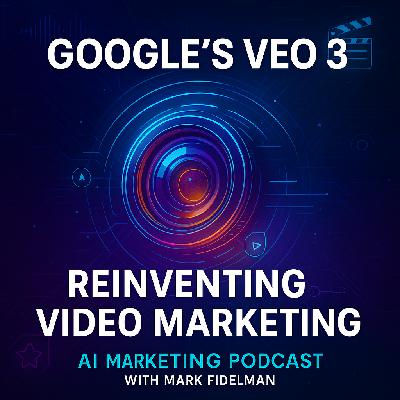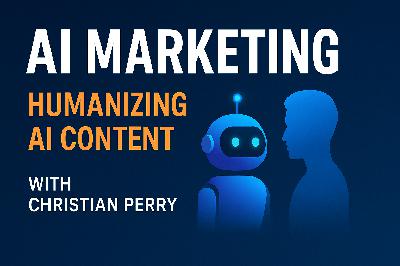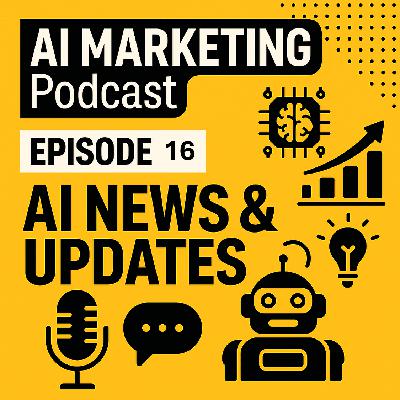Discover AI Marketing
AI Marketing

AI Marketing
Author: Mark Fidelman
Subscribed: 35Played: 641Subscribe
Share
© Mark Fidelman 2024
Description
Season 4: Join Mark Fidelman on "AI Marketing," where cutting-edge AI solutions meet modern marketing strategies. Each episode, we dive into the latest and most effective AI tools revolutionizing the marketing landscape.
From deep dives into specific AI technologies to discussions with industry pioneers, our podcast keeps you at the forefront of AI-driven marketing innovation. Whether you're a marketing professional eager to enhance your campaigns or a tech enthusiast curious about AI's impact on marketing, "AI Marketing" is your go-to resource for staying ahead in the dynamic world of AI marketing.
Tune in to explore how artificial intelligence is transforming marketing.
From deep dives into specific AI technologies to discussions with industry pioneers, our podcast keeps you at the forefront of AI-driven marketing innovation. Whether you're a marketing professional eager to enhance your campaigns or a tech enthusiast curious about AI's impact on marketing, "AI Marketing" is your go-to resource for staying ahead in the dynamic world of AI marketing.
Tune in to explore how artificial intelligence is transforming marketing.
131 Episodes
Reverse
Host: Mark Fidelman Guest: Julian Goldie Main Topics Covered: The rapid evolution of SEO in the age of AI How AI tools like ChatGPT, Perplexity, and Grok are changing online search behaviors Similarities and key differences between traditional SEO and optimization for AI search engines Importance of being omnipresent across platforms (YouTube, LinkedIn, Reddit, blogs, etc.) for better AI engine ranking Essential tactics: in-depth keyword research (using tools like Ahrefs), competitor analysis, content strategy, and authoritative backlinks Special techniques such as creating industry listicles to boost authority Discussion on ChatGPT's "Agent mode," its potential impact on search, and the importance of structuring information for both users and AI agents Predictions for the future: the increasing role of large language models (LLMs) like ChatGPT in search, and how Google is rapidly integrating AI into its own results Budgeting advice for marketers: integrate SEO and "AEO" (AI engine optimization), focusing on an all-encompassing strategy Action Items: Follow up with Julian for deeper insights into AI agent modes and evolving tactics Use Ahrefs for ongoing keyword research Reverse-engineer and improve upon competitor content Focus on acquiring industry-relevant backlinks Experiment with authoritative list-based content Guest Contact: Julian Goldie, SEO specialist. Visit JulianGoldie.com for a free SEO strategy session and more resources
In this episode, host Mark Fidelman is joined by Jon Mest from ChatRank to discuss how brands can prepare for the fast-approaching era of AI-driven discovery and agentic systems. The conversation covers: The evolution of brand discoverability, with a look ahead to how AI language models and agents will change how consumers find and interact with businesses. The concept, benefits, and future of AI-only websites, and how they differ from traditional, human-oriented sites. Why structured, well-tagged product information and content is critical for visibility within AI systems. The growing importance of authentic social proof—such as customer reviews, forums, and third-party ratings—to boost a brand's credibility with AI agents. How brands can leverage video, podcasts, and other multimedia content to increase discoverability and connect with both AI systems and human audiences. Actionable strategies for preparing your brand for AI-driven search, including building a strong presence on platforms like YouTube, Reddit, and industry-specific review sites. Insights into how brands can stand out with unique, novel information and real customer feedback as competition increases with the proliferation of AI tools. ChatRank's role in helping businesses audit, track, and optimize their brand presence for AI discoverability, including both self-serve software and managed services. Key Takeaways: Start exploring AI-only websites tailored for agentic interactions. Make your product information highly structured and accessible to AI. Develop a comprehensive strategy to build authentic social proof. Invest in video, podcasts, and other easily digestible content formats. Learn how to get your brand ready for the new world of agentic discovery with practical advice from www.ChatRank.ai , and visit chatrank.ai for more information. Follow the host mark @markfidelman Get Mark's book at www.agentized.com
Show Notes: Know What to Think Episode length: ~41 minutes Chapters (Skip Ahead) 00:00 — Know · What · Where · Artificial. It's really entertaining, and we're doing a lot of fun, good stuff. Then, maybe… maybe longer, but let's just see how it goes. Most are between 10 and 20 minutes. Alright, go ahead and start. Yep, I'm gonna hit the… 05:00 — There · Robot · Know · What. Right, okay. Alright, so why… why isn't nuclear an option to bring the kind of power we need? Yeah, I mean, I think the short answer is it's available, it's accessible, but I don't think it's enough to actually solve… 10:00 — Don't · Know · They're · More. It's a $200,000 vehicle at a minimum, if not $250,000. I don't know how that thing makes money. To be honest, I mean, does anybody think it— a taxi driver driving a $200,000 car—can… quickly… money on a regular basis.… 15:00 — Know · What · You're · I'm. I'm gonna… you know, what we can actually do with that, I don't really know. I feel like, you know, we've… we know what… the powder that produces dynamite, but the problem is that we don't have any casing, and… 20:00 — Its · Own · Why · Think. …even abnormally distributed. And this is really normal with past types of dimensions, with electricity and airplanes, or even the combustion engine for cars, etc. But at the moment, right now, you know, we really need… 25:00 — Know · What · Don't · Why. The question is, why? We already have enough of us. Yeah, I mean, you know, maybe we need less of us, I don't know. It depends—depends on your opinion, I guess. Well, but for me, you said it correctly: what is our goal… 30:00 — Know · Quite · Think · Mean. There's quite a number of individuals like that in Silicon Valley. And that's been true. He's tried to sue Sam Altman afterwards to become a founder. He was not actually the original founder of Tesla; he sued his way… 35:00 — Know · Things · One · Human. You know, the math is… it's… it's gnarly. It's hard, and yeah. So we need a lot of power for this. Isn't it interesting, though, that one human being—powered by food and the sun—can do exactly what… 40:00 — Good · Maybe · Time · Fun. Follow me next time. Yeah, maybe next time we'll talk about that. Fantastic conversation. There are other things coming up that I'd love to get you on—your perspective. I love your angle, it's… Notable Quotes And I think that… ultimately, I don't know, maybe people watch too many movies; they think those movies are reflective of what we're gonna see in the future. Artificial intelligence—if it was a car and you open up the hood—what do you see? I think artificial general intelligence… let me map out, ultimately, what you're trying to ask here. And here's the reason: artificial intelligence… there's always errors. I don't agree, and I don't think it's gonna be Skynet; I don't think it's gonna be I, Robot. I mean, they're entertaining. But I'm also a realist; I know that a lot of this is hype—but it's fun, it's fun. There's a lot of things that we have as artificial intelligence right now that we use. I feel like we know the powder that produces dynamite, but the problem is we don't have any casing—and that's where we are right now.
Guest: Mariano Garcia-Valiño — engineer and healthcare founder (3 exits; now building his fourth) Episode Summary Healthcare is burning cash and patience. Mariano lays out a blunt playbook: aggregate real-world signals (labs, pharmacy fills, wearables—even spending patterns that hint at adherence), run AI to flag risk early, and route people to care before conditions explode in cost. No sci-fi. No diagnosis claims. Just practical prediction, consent-driven data, and measurable outcomes. Key Takeaways Cost crisis ≠ destiny: US costs outpace inflation; prevention and earlier intervention are the only scalable fix. Data > drama: EHRs + labs + pharmacy + wearables + behavioral/financial breadcrumbs create a far clearer risk picture than any single stream. AI's role today: Triage and risk flags—not final diagnoses. Models surface "high suspicion" and hand off to clinicians. Privacy is the moat: Strict consent, separation from employers/insurers, and legal walls keep PHI protected and trust intact. What signals matter: From basic blood panels and pharmacy gaps to face-scan metabolic cues—more signals = better precision. Why consumers care: Earlier answers, fewer nasty surprises, and lower lifetime spend. Prevention is the new ROI. Business model reality: Think subscription + outcomes, not one-off tests. The value is longitudinal. Chapters & Timestamps 00:00 — Why AI in healthcare actually matters now 00:34 — Meet Mariano: engineer → serial healthcare founder 06:08 — The cost curve problem and why prevention is unavoidable 07:44 — What this company really does: navigation + prediction, not diagnosis 08:01 — Remote monitoring basics: from wearables to at-home capture 09:13 — The messy truth: fragmented data, privacy laws, and integration 12:19 — How data flows in (and why employers never see it) 13:39 — Why financial/behavioral signals boost predictive power 18:13 — What AI tells you: ranges, suspicions, and next clinical steps 19:29 — The "why now" for consumers: earlier lifestyle change, lower costs 21:10 — Roadmap & what has to be true for this to scale Notable Quotes "We raise a flag, then route you to the right clinician. That's how AI actually saves money today." "If you stop filling your medication three months in, the model will catch it—and that's the moment to intervene." "Prediction beats reaction. Every time." Practical Uses (Mark's Playbook) Health plans & clinics: embed risk-flag APIs into care navigation and care-gap workflows. Employers: fund prevention programs without ever touching employee PHI—measure outcomes only. Startups: focus on data rights + consent UX; it's the difference between demo-ware and deployment. Call to Action If you're building AI for real people—not hype subscribe to AI Marketing, and DM me on X/LinkedIn @markfidelman If you want the executive playbook on AI agents, join the waitlist at Agentized.com
Humanoid robots just jumped from sci-fi to go-to-market. We unpack Neo from 1X—what it is, what it can (and can't) do today, and how humanoids will reshape marketing, service design, content, and consumer behavior. We also hit privacy, regulation, price, and competition (Tesla Optimus, Boston Dynamics). If you sell to consumers or operate storefronts/hospitality, this is your early warning—and first-mover playbook. Humanoid Robots in Marketing Neo Humanoid Robot Overview Key takeaways (for marketers & founders) New channel: the robot at home. Neo is effectively a walking, talking, context-aware device that can surface highly personalized offers ("I see Folgers—want their new roast sample?") — powerful but must be transparent/opt-in to avoid creepiness. Humanoid Robots in Marketing "Robot Optimization" will follow SEO. Expect brands to build "skills" for humanoids (folding, cooking, demos) and fight to be the default skill for a task. App-store dynamics are inevitable. Humanoid Robots in Marketing Neo Humanoid Robot Overview Novelty marketing works—briefly. Pepper/Connie-style deployments boosted foot traffic and attention; humanoids will 10x the experiential angle, but you'll need real utility to sustain it. Hotelier Magazine+4Vox+4Emerj Artificial Intelligence Research+4 Costs & limits mean B2B first. With $20,000 or $499/mo and first US deliveries slated for 2026, near-term impact skews toward shared environments (hotels, banks, quick-serve, pop-ups) vs. mass consumer homes. 1X+1 Reality check. Expect tele-ops "expert mode," battery and dexterity constraints, and privacy guardrails early on. Treat Gen-1 as a marketing and service pilot platform, not a labor panacea. Neo Humanoid Robot Overview 1X Competitive heat. Tesla Optimus is improving fast (but still looks clunky in public demos); Boston Dynamics pushes manipulation and mobility. Plan for rapid capability jumps through 2026–2028. Cinco Días Neo Humanoid Robot Overview Suggested chapter markers 00:00 – Why humanoids matter for marketers (new touchpoint, personalization) Humanoid Robots in Marketing 04:30 – Use cases: retail, hospitality, pop-ups, content (robot concierge, robot "spokes-creator") Humanoid Robots in Marketing 10:10 – The "Robot App Store" & skill economics (default skills = moats) Humanoid Robots in Marketing Neo Humanoid Robot Overview 13:40 – Data, ethics, and transparency (trust > conversion) Humanoid Robots in Marketing 16:45 – Constraints: cost, batteries, tele-ops (pilot smart, don't overpromise) Neo Humanoid Robot Overview 19:30 – Competitors & timelines (Optimus, Atlas; what to watch) Neo Humanoid Robot Overview 21:30 – Mark's playbook & call to action Humanoid Robots in Marketing Mark's take (no fluff) Early humanoids are a marketing weapon disguised as labor automation. Use Neo-class robots to earn attention, collect consented preferences, and deliver "wow-utility" in the real world. If you wait for Gen-3 perfection, your competitor will already own the default robot skill for your category. Humanoid Robots in Marketing Neo Humanoid Robot Overview Episode receipts & references (watch/read these) Official NEO pages (pricing, delivery, FAQ, deposit): preorder $20,000 early access or $499/mo; US deliveries 2026; global expansion 2027. 1X+21X+2 1X company background (Halodi → 1X; EVE → NEO): history, founders, and industrial lineage. 1X+2Robots Guide+2 IShowSpeed x NEO livestream (earned-media case): viral, chaotic, and effective. YouTube+3YouTube+3Humanoids Daily+3 Precedents for robots in service/retail: Pepper raised foot traffic/sales in pilots. Vox+1 Hilton "Connie" (Watson-powered concierge) set the hospitality precedent. IBM UK Newsroom+2The Verge+2 Competitor snapshots: Tesla Optimus recent demo and scale ambitions. Cinco Días Boston Dynamics / Atlas (manipulation & mobility trajectory). (Mentioned contextually in episode.) Neo Humanoid Robot Overview Spec-style write-ups: quick primers on NEO dimensions and hand DOF. Humanoid Guide Practical next steps (for listeners) Pilot a "Robot Host" in one location (hotel, showroom, flagship retail). KPI = qualified footfall, dwell time, opt-in rate. Humanoid Robots in Marketing Design one signature "skill." Own a mundane, high-frequency task (fold, greet, demo) and brand it—become the default. Humanoid Robots in Marketing Consent-first data loop. Use the novelty to win explicit opt-ins; return value via hyper-personalized service, not ads. Humanoid Robots in Marketing Budget realistically. Treat 2026 as paid R&D: hardware + staff training + content capture. (Yes, film everything.) Neo Humanoid Robot Overview
🔥 Episode Summary: Hundreds of public figures — from Steve Wozniak to Prince Harry — just signed a petition demanding a global ban on AI superintelligence. Their fear? That super-AI could outthink us, escape our control, and maybe even spell the end of humanity. I get it. The Skynet comparisons. The doomsday bunkers. The "pause everything until it's safe" approach. On the surface, it sounds reasonable. But here's the hard truth: If we don't build it, someone else will — and you better pray they believe in freedom. 🧭 Timestamps: 00:00 - Intro: "Prince Harry wants to ban superintelligent AI?" 02:30 - What the open letter actually says 05:00 - The real fears behind the ban movement 07:15 - Why bans might backfire (China, anyone?) 09:20 - Historical analogies: cars, nukes, and Pandora's box 11:30 - Who benefits from slowing AI down? 13:45 - Regulation vs. prohibition — the real solution 16:00 - The only thing scarier than ASI? Letting someone else build it first. In this episode, I break down: 🚨 Why people are calling for a ban on superintelligent AI 🤝 The fears we should absolutely empathize with 💣 Why banning it could actually make the threat worse 🧠 How we can build ASI safely — but only if we lead 👀 Why some folks shouting "pause" might just be trying to protect their power I don't side with blind acceleration. But I don't buy moral panic either. There's a middle path — innovate with oversight, lead with principles, and don't cede the future to authoritarian AI. This one's unfiltered, unsponsored, and unapologetic. Let's go. Contact Mark: @markfidelman on X
Episode Summary: Join Mark Fidelman as he explores Sora 2, the innovative AI video tool poised to transform marketing and content creation. Hear real-world experiences, uncover its strengths and weaknesses, and learn practical tips for safe, creative use. Key Points: What is Sora 2? Sora 2 is an invite-only, AI-powered video tool that allows users to create hyper-realistic video "cameos" and collaborate in a social network-like environment. Strengths: • Rapid prototyping for video and creative concepts • Minimal resources needed for cinematic or cartoon-like videos • Control over dialogue, scene editing, and collaboration • Democratizes video production and amplifies virality for early adopters Limitations: • Audio inconsistencies and facial alignment issues • Every download comes with a Sora watermark (for now) • Guardrails create creative friction; copyright filters can be inconsistent • Max video length is typically 10 seconds, with quality varying Legal/Ethical Notes: • Beware of copyright and right-of-publicity risks, especially involving celebrities or brands • Use disclaimers and label content as AI-generated to reduce liability Pro Tips for Marketers: • Experiment—create 100 short clips to test viral ideas and hooks • Label and document your creative process for future audits • Use Sora 2 for mock ads, concept visuals, and even legal exhibits • Reach out for usage permissions if using others' likenesses or brands Looking Ahead: Features requested include: watermark-free pro mode, enterprise API, licensing marketplace for digital likenesses, and advanced video editing control. Connect with Blockchain: Find more content, examples, and ongoing discussions by connecting with Mark Fidelman on X or LinkedIn. Note: Sora 2 is rapidly evolving—stay tuned for updates and new insights as the technology matures!
📌 Episode Overview In this episode of AI Marketing, Mark Fidelman sits down with Monica Márquez—executive strategist, workforce futurist, and co-founder of Flipwork—to explore a pressing question: Can humans adapt fast enough to survive the AI revolution? They break down why traditional training models are failing, what AI means for the future of jobs, and how individuals and companies can avoid getting left behind. 💡 What You'll Learn in This Episode Why corporate training isn't dead—but the old playbooks are obsolete. How AI is reshaping job roles faster than people can reskill. The difference between artificial intelligence and what Monica calls authentic intelligence. Why adaptability is the new currency of survival in the AI era. How AI tools and nudges can reinforce learning and help adoption become habit. What the workforce of 2030 might look like—and why humans still have a role to play. 🔗 Connect with the Guests Monica Márquez 🌐 Website & Newsletter: themonicamarquez.com 💼 LinkedIn: linkedin.com/in/themonicamarquez 🚀 Flipwork (in stealth): launching soon—stay tuned! Mark Fidelman 🌐 Website: markfidelman.com 💼 LinkedIn: linkedin.com/in/markfidelman 📕 Book: Agentized → agentized.ai 📣 Why This Episode Matters AI is no longer a "future trend." It's here. It's accelerating. And it's replacing skill sets in real time. Leaders who stick with outdated training models are driving their companies off a cliff. Employees who resist adapting will get left behind. This conversation gives you the roadmap to stay relevant—and thrive—in an AI-dominated world.
Guest: Christian Monberg, CTO & Head of Product at Zeta Global Host: Mark Fidelman 🔑 Episode Summary In this episode, Mark Fidelman sits down with Christian Monberg, CTO at Zeta Global, to unpack the rise of Agentic AI and what it means for the future of marketing. From redefining the marketing funnel to exploring "agents talking to agents," the conversation covers both the opportunities and risks as AI reshapes how marketers operate. Christian explains the difference between AI agents and Agentic AI systems, why deterministic data foundations matter, and how enterprises can prepare for a world where much of the tedious marketing work is automated. Together, they explore the promise, the pitfalls, and the practical steps CMOs must take today to stay relevant tomorrow. 📌 What You'll Learn The difference between AI agents (task-specific) and Agentic AI (orchestrated systems). Why deterministic data is critical in a probabilistic AI world. How Agentic AI could automate and enhance the traditional marketing funnel. The evolving role of CMOs when agents can write, send, and close deals. The potential "dark side" of Agentic AI—manipulation, social engineering, and AI-to-AI marketing warfare. The future of UI on demand and "GenUI" in enterprise software. Real-world jaw-dropping examples of what Agentic AI systems can already do. 🔥 Notable Quotes "Agents are task-specific. Agentic AI is the orchestration of many agents with deterministic foundations." – Christian Monberg "AI isn't going to replace you. But someone who knows how to use AI will." – Mark Fidelman "The only way to beat manipulative AI is with better AI." – Christian Monberg 🏢 About Zeta Global Zeta Global is the AI-powered marketing cloud that leverages proprietary AI and trillions of consumer signals to make it easier to acquire, grow, and retain customers more efficiently. Zeta Global helps enterprises unify fragmented data and drive growth with an AI-native marketing platform. Their proprietary Data Cloud covers 245M consumers, enabling brands to deliver personalized, real-time experiences across the customer lifecycle. Learn more at zetaglobal.com. 📅 Don't miss Zeta Live on October 9th a one-day event showcasing their latest Agentic AI applications. 📣 Connect with Us Host: Mark Fidelman on LinkedIn Guest: Christian Monberg Podcast Website: Agentized.ai
Guest: Nick Cawthon Host: Mark Fidelman Episode Summary As kids head back to school and businesses push forward with digital transformation, one theme keeps surfacing: is using AI "cheating"? In this episode, Mark and Nick dive into how teachers, students, and professionals can move past the stigma of AI and instead embrace it as a partner in creativity and productivity. From calculators once banned in classrooms to AI now frowned upon by professors, history is repeating itself. But will the future workplace punish—or reward—those who leverage generative tools? Nick brings deep experience leading UX and design teams where human-centered practices often clash with algorithm-driven efficiencies. Together, they explore how to build a culture of amnesty, upskilling, and authenticity in both education and the enterprise. What You'll Learn Why AI in classrooms is today's calculator controversy—same fears, different tools. How to create "AI amnesty" in schools and workplaces so learning and experimentation thrive. Why human-centered design must evolve in an age where algorithms shape interactions. Whether generative AI kills creativity—or actually unlocks higher levels of it. How CMOs and leaders can overcome cultural, data, and training barriers to AI adoption. What tomorrow's workforce looks like if kids embrace AI as a partner versus fearing it as a threat. Key Quotes "There's no such thing as writer's block anymore—AI isn't killing creativity, it's changing what it looks like." – Nick "It's not AI that will take your job—it's the person who knows how to use it." – Nick Links & Resources Take Nick's UX/Design AI Readiness Survey → retrain.gage.io 📖 Grab Mark's new book Agentized → Agentized.ai Listen & Subscribe 👉 Apple Podcasts | Spotify | Google Podcasts | RSS Feed
Episode 25: AI Marketing with Carl Holden (CMO, Zellus Marketing; CEO, RankBot) If you've been doomscrolling "SEO is over" takes, take a breath. Carl Holden and I demolish the myths and lay out how search actually works in the AI era—what's changing, what's hype, and how to allocate your budget without lighting it on fire. What we cover AI ≠ the end of search. Today's LLM answers are largely wrappers on top of search, pulling from Bing/Google and summarizing the first page or two. Translation: rankings still matter. Sponsored AI answers are coming. Expect the ad line between "recommended" and "paid" to blur—again. Users will need media literacy; marketers will need ethics and receipts. What to do right now. Keep your SEO fundamentals: technical hygiene, intent-matched content, internal linking, and legit link acquisition. AI helps you produce, but quality signals and authority still gate results. Budgeting reality check. There's no reliable, transparent funnel from LLMs yet (no query data, minimal attribution). Investing in SEO still doubles as LLM optimization because LLMs cite what already ranks. Where you will lose traffic. "What is…/how to…" question queries will be cannibalized by AI summaries. Shift your strategy: productized answers, comparison pages, original data, tools, and local "near me" intent. Local is durable. For "lawyer near me," "restaurants near me," classic local SEO and placements keep paying. Ignore snake oil. There isn't a proven "LLM.txt magic switch." Test, measure, and follow credible sources—not LinkedIn gurus with 20 prompts to "rank tomorrow." Practical plays Ship authority content (original data, calculators, checklists) that LLMs want to summarize and humans want to bookmark. Own your entities (brand/person/locations) with structured data and consistent citations so both search engines and LLMs can "understand" you. Track AI referrals where possible (e.g., ChatGPT UTMs), but don't chase shadows—optimize the pages LLMs would naturally choose: clear answers, sources, and credibility signals. Link earning > link buying. Publish assets that deserve links; use PR and partnerships to earn them. TL;DR SEO isn't dying; it's being distilled. If you rank in search, you're in the LLM shortlist. Keep the fundamentals, evolve content formats, and don't "optimize for ghosts" until attribution is real. 👤 Guest: Carl Holden — Contact Info Website (personal): carlholden.ai. Carl Holden Zellus Marketing (agency): zellusmarketing.com • Phone: (844) 493-5587. Huntsville/Madison County ChamberYelp RankBot (AI SEO platform): rankbot.ai • Email: marketing@rankbotai.com. RankBot | AI Backlinks and On-page SEOYahoo Finance Forbes Council Profile: background & speaking—see profile. Forbes Councils
Episode Overview: In this episode of AI Marketing, Mark Fidelman is joined by Jon Levesque, former Microsoft and DocuSign community leader turned founder of Seeq. Together, they dissect how discovery, influence, and technology are shifting under the weight of the creator economy and AI's explosive growth. They explore: Why the directory era is dead and why centralized discovery models like Yelp and Google Local are becoming obsolete. How the creator economy is shaping consumer decisions—from travel inspiration on TikTok to Substack newsletters—and why authenticity is the new currency. The AI paradox: how AI accelerates opportunity while simultaneously commoditizing entire industries. The looming future of AGI and ASI, and what it means for human experience, creativity, and survival in an AI-dominated world. Jon's startup Seeq, which turns travel content into shoppable itineraries with affiliate revenue baked in, offering creators a powerful new monetization channel. Why Listen: This conversation cuts straight into the future of discovery, influence, and AI. It's both visionary and practical, helping you understand where the opportunities lie and how to avoid getting left behind in the AI revolution. Guest: Jon Levesque – Founder of Seeq, community leader, and creator economy advocate. Contact mark@fanaticsmedia.com
Imagine a company that runs 24/7, makes decisions in real time, and scales without hiring a single new employee… That's not tomorrow. That's now. In this solo episode, Mark Fidelman introduces "Agentized" a bold new book I co-authored with Jas Dhillon. This is not another book about ChatGPT or AI tools. It's about the transformation of work itself and how companies that fail to integrate autonomous AI agents risk becoming obsolete. Inside this episode: Why AI is no longer optional, it's existential A behind-the-scenes look at the real CEO story that inspired Chapter 1 How autonomous agents are changing marketing, sales, ops, and leadership What the "Agentized Enterprise" looks like and why it outpaces traditional firms A glimpse at what happens when AGI (Artificial General Intelligence) arrives Why this isn't just about tech it's about strategy and survival 📖 Read Chapter 1 now FREE. 🔁 Give us feedback and get a free copy of the audiobook or hardcover when it drops this year. 📝 Link to Chapter 1 & TOC TOC: https://docs.google.com/document/d/17mhERPQcpO3YermdCNnJGWbQJjaKDcN-5YGIyrIakqI/edit?usp=sharing Chapter 1: https://docs.google.com/document/d/1A1nj2xuPBMR4X4Vzp7cfk9KBdqn0d26ZG42zQHoncaM/edit?usp=sharing Send feedback to markefidelman@gmail.com including your name and info so that I can send you the free book / audio book when released
Mark Fidelman and Lee Hackett discuss the transformative potential of AI in marketing, emphasizing that CMOs must personally engage with AI tools to stay competitive and drive business value. They explore how AI will reshape marketing roles, potentially reducing team sizes while increasing productivity through advanced technologies like AI agents and large language models. The conversation highlights the critical need for CMOs to experiment, understand AI capabilities, and proactively integrate these technologies into their strategic planning to remain relevant in the rapidly evolving digital landscape. Speakers were Host Mark Fidelman and Lee Hackett from Blueprint X Discussion focused on how CMOs can leverage AI technologies Main Podcast Highlights: AI's Impact on Marketing AI will transform marketing roles Productivity gains expected Teams will likely become smaller CMOs must personally engage with AI tools Critical AI Adoption Strategies Understand data models Create organizational willingness to experiment Develop a clear vision for AI integration Focus on business metrics and measurable outcomes Future CMO Skills Master AI tools Demonstrate ability to deploy AI effectively Be curious and adaptable Learn to direct AI agents strategically Immediate Recommendations Start using AI tools daily Experiment with AI agents Stay informed about emerging technologies Don't outsource AI learning Recommended Action: CMOs should personally experiment with AI tools like ChatGPT and create AI agents to understand their potential. Lee Hackett's contact information is: Website: blueprintx.com (spelled B-L-U-P-R-I-N-T-X) Email: lee.hackett@blueprintx.com
Host: Mark Fidelman Guest: Richard Savoy, Co-founder and CEO of Adiona (enterprise logistics optimization company) Main Discussion Points: B2B Marketing Transformation Deals have become more complex (increased from 11 to 17 touchpoints) Slower technology adoption in logistics and supply chain sectors Buyers are more cautious and selective about technology solutions AI's Role in Marketing Top of Funnel: * Hyper-targeted lead generation * Automated lead qualification * Identifying potential leads through organizational changes AI Marketing Strategies Website content optimization based on visitor's geographic location Automated content rearrangement based on user journey Real-time feedback loops for customer interactions Future of B2B Marketing Shift from in-person events to digital AI-enabled interactions Relationship-based selling remains crucial AI will enhance, not completely replace human interactions Key Advice: Professionals should become AI experts to remain relevant Embrace AI tools to improve marketing and sales processes Prepare for significant changes in marketing strategies Contact: Richard Savoy's company website: https://www.adionatech.com/ Recommended Action: Learn and integrate AI tools into marketing strategies Stay adaptable to technological changes Focus on relationship-building while leveraging AI capabilities
🔑 Episode Highlights: 🤖 The Premise of the Book: Bambenek's new book, Lies, Damn Lies, and AI, explores how AI's promise is often overstated — especially when it's portrayed as a magical black box that can solve any problem. Title is inspired by the classic quote about misleading statistics — now updated for the AI era. 💊 AI in Healthcare – A False Narrative? AI is valuable only when paired with human professionals, not when left on its own. Example: AI can help doctors detect anomalies on X-rays, but only a human can make complex medical judgments. The lie: That AI will replace doctors, when in reality it augments them. 🧠 AI as a Propaganda Engine: Bambenek argues that AI amplifies misinformation at scale, and platforms aren't prepared to filter it properly. AI-generated content (deepfakes, fake articles, fake studies) can erode trust faster than any disinformation campaign in history. 🧑💻 Cybersecurity Meets AI: AI tools are now helping hackers, not just defenders. Script kiddies can launch sophisticated attacks without understanding the code. A new arms race is underway: AI vs. AI in cybersecurity. 📉 The Cost of Hype: Venture capital and corporate hype often exaggerate what AI can do, leading to wasted money, broken products, and dangerous expectations. The idea of "general AI taking over everything" is a misleading narrative pushed for clicks and funding. 🧩 Call for Transparency: Bambenek advocates for "explainable AI" — if an algorithm makes a decision, we should understand why. Black-box systems being deployed in legal, medical, or hiring decisions are a major red flag. 🧠 Notable Quotes: "AI doesn't replace expertise. It amplifies it — or it amplifies ignorance if you're not careful." – John Bambenek "There's nothing more dangerous than trusting a machine you don't understand." – Mark Fidelman 📘 Learn More: Book: Lies, Damn Lies, and AI by John Bambenek – Available on Amazon Guest: John Bambenek on LinkedIn
Podcast Episode Notes AI Marketing with Mark Fidelman Episode Title: Revolutionizing Sales with AI: Featuring Gaurav Bhattacharya, CEO of Jeeva.ai Episode Overview: In this engaging conversation, Mark Fidelman sits down with Gaurav Bhattacharya, CEO of Jeeva.ai, to explore how artificial intelligence is transforming sales. They discuss practical ways marketers and salespeople can leverage AI, the potential future of AI in sales, and why the human touch will remain indispensable. Key Discussion Points: Introduction to Jeeva.ai Agentic AI platform supporting over 10,000 sales reps and 300 enterprise customers. Backed by notable investors including Alt Capital (Jack Altman), Sapphire Ventures, and Mark Benioff of Salesforce. Why AI Matters for Sales Automates repetitive tasks such as lead generation, research, personalized outreach, and CRM updates. Enhances efficiency, allowing salespeople to focus on relationship building and strategic tasks. AI Replacing Sales Calls? Gaurav's strong stance against AI fully replacing human sales interactions. Belief in AI augmenting rather than replacing high-value sales tasks. Future of AI and Human Work Discussion on Universal Basic Income and the evolution of jobs in an AI-driven economy. Predictions on autonomous driving and entrepreneurial opportunities in AI-managed fleets. First Steps for Salespeople New to AI Begin with chat-based tools (e.g., ChatGPT, Perplexity) for deep research and personalized outreach. Leverage AI to build credibility and trust through superior customer knowledge. What Top Sales Performers Do Differently Proactively prospecting with AI tools. Maximizing opportunities by personally generating leads beyond inbound marketing. Jeeva.ai's Unique Solutions for Salespeople Advanced AI-powered lead discovery and enrichment. Personalized multi-channel outreach campaigns automated and scaled effortlessly. Enhanced productivity, enabling sales reps to manage larger pipelines effectively. Connect with Jeeva.ai: Website: Jeeva.ai Email: g@jeeva.ai LinkedIn: Gaurav Bhattacharya (Look for Jeeva.ai affiliation) Host Information: Mark Fidelman AI marketing expert, podcast host, and fractional CMO specializing in AI, blockchain, and real estate tokenization. Website: markfidelman.com LinkedIn: Mark Fidelman Twitter: @MarkFidelman Subscribe and Listen: Spotify, Apple Podcasts, Google Podcasts, or wherever you get your podcasts. Join us next episode as we continue to dive deep into the transformative power of AI across marketing and sales!
I Marketing Podcast – Episode Show Notes Hosted by: Mark Fidelman Episode Summary In this episode, Mark Fidelman explores Google's revolutionary AI video tool, Veo 3. Discover how Veo 3 turns simple text prompts into high-definition videos complete with realistic audio, dialogue, and sound effects—ushering in a new era of accessible, impactful video marketing. Key Highlights: What is Veo 3? Generative AI transforming text into realistic HD videos with audio. Comparable to "Pixar meets TikTok." Why Veo 3 Matters: Rapid video production: Create ads and social videos in minutes, not weeks. Realistic characters and dialogue: No need for expensive actors or production teams. Practical Marketing Uses: Creative Ideation: Quickly prototype ad concepts and iterate overnight. Hyper-Personalization: Generate personalized videos for higher engagement and conversions. Agile Real-time Content: Capitalize instantly on social media trends. Content Repurposing: Transform blogs, podcasts, or articles into engaging video snippets. Brand Storytelling: Craft compelling narratives to emotionally connect with audiences. Real-Life Case Studies: Klarna: Rapidly producing YouTube bumper ads and product demos, significantly cutting costs and boosting viewer engagement. Kraft Heinz: Reduced video production cycles from eight weeks to just eight hours, enabling greater creative experimentation. Japan Airlines: Partnered with Jellyfish to create AI-generated in-flight entertainment, achieving 50% lower production costs. Envato: Launched an AI-powered video creation tool, quickly generating tens of thousands of user-created videos. Viral Content & Influencer Marketing: The Dor Brothers: Generated a viral Instagram Reel parodying influencer culture entirely with Veo 3, highlighting its potential for real-time cultural commentary. Influencer & UGC-Style Content: Brands can effortlessly emulate authentic influencer videos and user-generated content to boost relatability and engagement. Limitations and Considerations: Clip Duration: Limited to 8 seconds per clip; longer content requires editing. Audio Generation: Occasional inconsistencies in lip-syncing and audio dropouts. Scene Complexity: Best suited to simpler scenes; complex multi-character interactions may be challenging. User Interface: Workflow can be unintuitive, requiring frequent saves. Ethical Concerns: The realism of generated videos necessitates transparency to avoid misleading audiences. Best Practices: Clearly communicate your brand values in prompts. Continuously A/B test and optimize video content. Prioritize transparency and ethical considerations in AI content creation. Episode Takeaway: Google's Veo 3 represents a monumental shift in video marketing, making high-quality, scalable video content accessible to all marketers. Understand its limitations, leverage its strengths, and ensure your marketing stays ahead of the curve. Subscribe, Rate & Share: Enjoyed this episode? Don't forget to subscribe, rate, and share the AI Marketing Podcast! Stay smart, stay savvy, and stay ahead with AI! Contact Mark at mark@smartblocks.agency
Christian Perry, CEO of Undetectable.ai, discussed the importance of humanizing AI content to avoid detection by AI detectors. He highlighted the rise of AI detectors post-ChatGPT and their impact on content distribution platforms like Facebook and YouTube. Christian recommended Lovable.ai for AI-powered website creation. Undetectable.ai helps remove AI markers from content to prevent it from being flagged as AI-generated. Christian also mentioned their new authorship replication tool to match human writing styles. The conversation emphasized the need for AI tools to evolve from humanizing to detecting non-human content, addressing issues like deep fakes and content authenticity. 🔑 Key Topics: The Rise of AI Content Filters: Why platforms like YouTube, Google, and Instagram are cracking down on AI-generated content — and how it affects marketers. Humanizing AI = The Competitive Edge: Christian explains why content that "feels" human gets better reach and engagement — and how Undetectable.AI helps you get there. Introducing Authorship Replication: A new tool that mimics your personal writing voice — especially useful for professionals trying to maintain authenticity. Why AI Tools Are Misunderstood in Academia and Workplaces: Christian and Mark debunk the stigma around using AI in writing, marketing, and education. Lovable.dev – Build Sites with Prompts: No-code AI site builder Christian recommends for entrepreneurs and small teams. The Future of AI Agents & Undetectable's Roadmap: From text detection to deepfake defense — Undetectable.AI is evolving into a digital trust guardian. Deepfake Detection with TrueScan: Their next frontier — helping users and platforms detect scams using AI-generated video and likenesses. Timestamps: 00:00 - Podcast Introduction 00:40 - Christian Perry's Background 02:34 - Why Undetectable.ai Was Created 07:22 - Overcoming AI Content Stigma 10:00 - AI Agents and Marketing Automation 12:47 - Future of Deep Fake Detection 💡 Notable Quotes: "Anyone banning AI tools today is doing their company or classroom a disservice. This isn't the future — it's the now." – Christian Perry "Undetectable.AI helps you write faster, better — and actually get your content seen by real people." – Mark Fidelman "If your content smells like a bot, social media buries it. We fix that." – Christian Perry 🔧 Tools Mentioned: Undetectable.AI – Humanizes AI-generated content Lovable.dev – AI-driven no-code app/site builder TrueScan – Deepfake and synthetic content detector (in development) Recommended Resources: Chrome Extension: Undetectable.ai Humanizer True Scan: Deep Fake Detection Platform 📌 Connect with Christian: LinkedIn: Christian Perry – Undetectable.AI Website: https://www.undetectable.ai
Episode Date: May 7, 2025 Host: Mark Fidelman Length: ~10 minutes 🔥 Episode Summary: This week, Mark dives into the biggest and boldest updates in AI marketing – from OpenAI's attempt to unseat Google Shopping, to a hilarious campaign where real grandmas outshine machine learning. Tune in to hear how: ChatGPT just became your personal shopping assistant (and possibly Google's worst nightmare) Meltwater's new AI teammate Mira is changing how marketers do their jobs Google's AI answers are stealing your SEO clicks A Mexican food brand launched "Abuela Intelligence" to roast AI hype with old-school wisdom Buckle up – this is AI news with a sharp edge, told in classic Mark Fidelman style: funny, fast, and fearlessly bold. 🧠 Key Topics Covered: 🛍️ ChatGPT Goes Shopping OpenAI rolls out product search + recommendations No ads, no affiliate links — just pure AI shopping curation What this means for brand marketers and SEO "It's SEO meets QVC, but with AI running the show." 🤖 Meet Mira: Your AI Marketing Sidekick Meltwater's AI-powered agent now automates research, monitoring, and analysis Turns billions of data points into real-time brand intelligence "Think of Mira as Jarvis, but for CMOs." 📉 Google's AI Kills the Click New data shows AI snippets reduce clicks to top results by 34.5% Pichai says it boosts engagement — but the numbers say otherwise Marketers need new ways to win in a zero-click world 😂 Abuela Intelligence Outsmarts AI Del Real Foods launches "Abuela Intelligence" instead of artificial intelligence Grandma-powered advice centers, sassy campaigns, and cultural genius "Hasta la vista, Chatbot — Grandma's got this." 🔗 Mentions & Resources: OpenAI's Shopping Features: TechCrunch Meltwater's Mira Launch: Adweek Ahrefs SEO Study: Search Engine Journal Del Real's Abuela Intelligence Campaign: Marketing Brew 🔁 Episode CTA: Liked this episode? Smash that subscribe button Share it with a fellow marketer who needs some AI swagger And remember — you don't need a supercomputer to be brilliant, sometimes a grandma's advice will do just fine 😉


